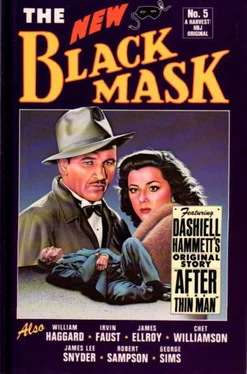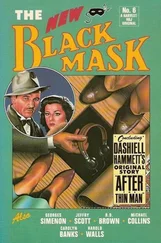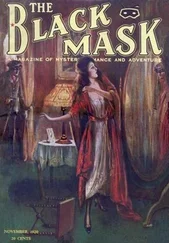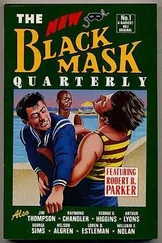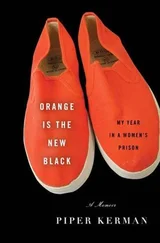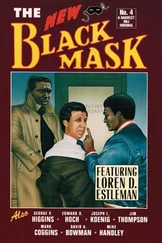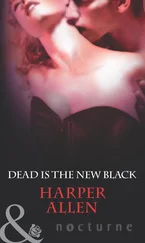William Haggard - The New Black Mask (No 5)
Здесь есть возможность читать онлайн «William Haggard - The New Black Mask (No 5)» весь текст электронной книги совершенно бесплатно (целиком полную версию без сокращений). В некоторых случаях можно слушать аудио, скачать через торрент в формате fb2 и присутствует краткое содержание. Год выпуска: 1986, ISBN: 1986, Издательство: A Harvest/HJB book Harcourt Brace Jovanovich, Жанр: Детектив, на английском языке. Описание произведения, (предисловие) а так же отзывы посетителей доступны на портале библиотеки ЛибКат.
- Название:The New Black Mask (No 5)
- Автор:
- Издательство:A Harvest/HJB book Harcourt Brace Jovanovich
- Жанр:
- Год:1986
- ISBN:9780156654845
- Рейтинг книги:4 / 5. Голосов: 1
-
Избранное:Добавить в избранное
- Отзывы:
-
Ваша оценка:
- 80
- 1
- 2
- 3
- 4
- 5
The New Black Mask (No 5): краткое содержание, описание и аннотация
Предлагаем к чтению аннотацию, описание, краткое содержание или предисловие (зависит от того, что написал сам автор книги «The New Black Mask (No 5)»). Если вы не нашли необходимую информацию о книге — напишите в комментариях, мы постараемся отыскать её.
The New Black Mask (No 5) — читать онлайн бесплатно полную книгу (весь текст) целиком
Ниже представлен текст книги, разбитый по страницам. Система сохранения места последней прочитанной страницы, позволяет с удобством читать онлайн бесплатно книгу «The New Black Mask (No 5)», без необходимости каждый раз заново искать на чём Вы остановились. Поставьте закладку, и сможете в любой момент перейти на страницу, на которой закончили чтение.
Интервал:
Закладка:
“Bench warrant issued?”
“Not yet.”
“Then don’t waste your time.”
“What are you talking about?”
“Small potatoes. Call Lieutenant Holland at University dicks and tell him Simpkins is half of the heist team he’s looking for. Tell him to put out an APB and add, ‘armed and extremely dangerous’ and ‘apprehend with all force deemed necessary.’ ”
Al whistled again. “That bad?”
I said, “Yeah,” and hung up. “Apprehend with all force deemed necessary” was the L.A.P.D. euphemism for “shoot on sight.” I felt my fear decelerate just a notch. Finding fugitive felons was my job. Slipping an extra piece into my back waistband, I set out to find the man who had vowed to kill me.
After picking up standing mugs of Simpkins and a carbon of the robbery report from Georgie Caulkins, I drove toward the West Adams district. The day was hot and humid, and sidewalk mobs spilled into the street, passing victory bottles to horn-honking motorists. Traffic was bottlenecked at every stoplight, and paper debris floated down from office windows — a makeshift ticker-tape parade. The scene made me itchy, so I attached the roof light and hit my siren, weaving around stalled cars until downtown was a blur in my rearview mirror. When I slowed, I was all the way to Alvarado and the city I had sworn to protect looked normal again. Slowing to a crawl in the right-hand lane, I thought of Wallace Simpkins and knew the itch wouldn’t stop until the bastard was bought and paid for.
We went back six years, to the fall of ’39, when I was a vice officer in University Division and a regular light-heavyweight attraction at the Hollywood-Legion Stadium. A black-white stickup gang had been clouting markets and juke joints on West Adams, the white guy passing himself off as a member of Mickey Cohen’s mob, coercing the proprietor into opening up the safe for the monthly protection payment while the negro guy looked around innocently, then hit the cash registers. When the white guy got to the safe, he took all the money, then pistol-whipped the proprietor senseless. The heisters would then drive slowly north into the respectable Wilshire district, the white guy at the wheel, the negro guy huddled down in the back seat.
I got involved in the investigation on a fluke.
After the fifth job, the gang stopped cold. A stoolie of mine told me that Mickey Cohen found out that the white muscle was an ex-enforcer of his and had him snuffed. Rumor had it that the colored guy — a cowboy known only as Wild Wallace — was looking for a new partner and a new territory. I passed the information along to the dicks and thought nothing more of it. Then, a week later, it all hit the fan.
As a reward for my tip, I got a choice moonlight assignment: bodyguarding a high-stakes poker game frequented by L.A.P.D. brass and navy bigwigs up from San Diego. The game was held in the back room at Minnie Roberts’s Casbah, the swankiest police-sanctioned whorehouse on the south side. All I had to do was look big, mean, and servile and be willing to share boxing anecdotes. It was a major step toward sergeant’s stripes and a transfer to the Detective Division.
It went well — all smiles and backslaps and recountings of my split-decision loss to Jimmy Bivins — until a negro guy in a chauffeur’s outfit and an olive-skinned youth in a navy officer’s uniform walked in the door. I saw a gun bulge under the chauffeur’s left arm, and chandelier light fluttering over the navy man’s face revealed pale negro skin and processed hair.
And I knew.
I walked up to Wallace Simpkins, my right hand extended. When he grasped it, I sent a knee into his balls and a hard left hook at his neck. When he hit the floor, I pinned him there with a foot on his gun bulge, drew my own piece, and leveled it at his partner. “Bon voyage, Admiral,” I said.
The admiral was named William Boyle, an apprentice armed robber from a black bourgeois family fallen on hard times. He turned state’s evidence on Wild Wallace, drew a reduced three-to-five jolt at Chino as part of the deal, and was paroled to the war effort early in ’42. Simpkins was convicted of five counts of robbery one with aggravated assault, got five-to-life at Big Q, and voodoo-hexed Billy Boyle and me at his trial, vowing on the soul of Baron Samedi to kill both of us, chop us into stew meat, and feed it to his dog. I more than half believed his vow, and for the first few years he was away, every time I got an unexplainable ache or pain I thought of him in his cell, sticking pins into a blue-suited Lee Blanchard voodoo doll.
I checked the robbery report lying on the seat beside me. The addresses of the four new black-white stickups covered 26th and Gramercy to La Brea and Adams. Hitting the racial demarcation line, I watched the topography change from negligent middle-class white to proud colored. East of St. Andrews, the houses were unkempt, with peeling paint and ratty front lawns. On the west the homes took on an air of elegance: small dwellings were encircled by stone fencing and well-tended greenery; the mansions that had earned West Adams the sobriquet High Dark-town put Beverly Hills pads to shame — they were older, larger, and less architecturally pretentious, as if the owners knew that the only way to be rich and black was to downplay the performance with the quiet noblesse oblige of old white money.
I knew High Darktown only from the scores of conflicting legends about it. When I worked University Division, it was never on my beat. It was the lowest per capita crime area in L.A. The University brass followed an implicit edict of letting rich black police rich black, as if they figured blue suits couldn't speak the language there at all. And the High Darktown citizens did a good job. Burglars foolish enough to trek across giant front lawns and punch in Tiffany windows were dispatched by volleys from thousand-dollar skeet guns held by negro financiers with an aristocratic panache to rival that of anyone white and big-moneyed. High Darktown did a damn good job of being inviolate.
But the legends were something else, and when I worked University, I wondered if they had been started and repeatedly embellished only because square-john white cops couldn't take the fact that there were “niggers,” “shines,” “spooks,” and “jigs” who were capable of buying their low-rent lives outright. The stories ran from the relatively prosaic: negro bootleggers with mob connections taking their loot and buying liquor stores in Watts and wetback-staffed garment mills in San Pedro, to exotic: the same thugs flooding low darktowns with cut-rate heroin and pimping out their most beautiful high-yellow sweethearts to LA's powers-that-be in order to circumvent licensing and real estate statutes enforcing racial exclusivity. There was only one common denominator to all the legends: it was agreed that although High Darktown money started out dirty, it was now squeaky clean and snow white.
Pulling up in front of the liquor store on Gramercy, I quickly scanned the dick's report on the robbery there, learning that the clerk was alone when it went down and saw both robbers up close before the white man pistol-whipped him unconscious. Wanting an eyeball witness to back up Lieutenant Holland's APB, I entered the immaculate little shop and walked up to the counter.
A negro man with his head swathed in bandages walked in from the back. Eyeing me top to bottom, he said, “Yes, officer?”
I liked his brevity and reciprocated it. Holding up the mug shot of Wallace Simpkins, I said, “Is this one of the guys?”
Flinching backward, he said, “Yes. Get him.”
“Bought and paid for,” I said.
An hour later I had three more eyeball confirmations and turned my mind to strategy. With the all-points out on Simpkins, he’d probably get juked by the first blue suit who crossed his path, a thought only partly comforting. Artie Holland probably had stakeout teams stationed in the back rooms of other liquor stores in the area, and a prowl of Simpkins’s known haunts was a ridiculous play for a solo white man. Parking on an elm-lined street, I watched Japanese gardeners tend football field-sized lawns and started to sense that Wild Wallace’s affinity for High Dark-town and white partners was the lever I needed. I set out to trawl for pale-skinned intruders like myself.
Читать дальшеИнтервал:
Закладка:
Похожие книги на «The New Black Mask (No 5)»
Представляем Вашему вниманию похожие книги на «The New Black Mask (No 5)» списком для выбора. Мы отобрали схожую по названию и смыслу литературу в надежде предоставить читателям больше вариантов отыскать новые, интересные, ещё непрочитанные произведения.
Обсуждение, отзывы о книге «The New Black Mask (No 5)» и просто собственные мнения читателей. Оставьте ваши комментарии, напишите, что Вы думаете о произведении, его смысле или главных героях. Укажите что конкретно понравилось, а что нет, и почему Вы так считаете.
